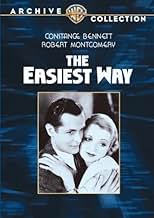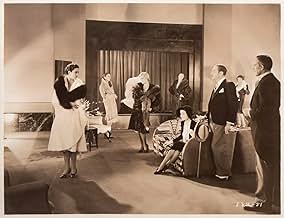Ajouter une intrigue dans votre langueLaura from a poor family rejects her boyfriend for a wealthy older man. She falls for a younger journalist, leaves the wealthy man but struggles financially.Laura from a poor family rejects her boyfriend for a wealthy older man. She falls for a younger journalist, leaves the wealthy man but struggles financially.Laura from a poor family rejects her boyfriend for a wealthy older man. She falls for a younger journalist, leaves the wealthy man but struggles financially.
- Réalisation
- Scénario
- Casting principal
- Récompenses
- 1 victoire au total
- Hotel Clerk
- (non crédité)
- Brockton Associate
- (non crédité)
- Women at Cook-Out
- (non crédité)
- Andy Murdock
- (non crédité)
- Chris Swoboda - Laura's Suitor
- (non crédité)
- Bud Williams
- (non crédité)
- Mrs. Clara Williams
- (non crédité)
- Mr. Gensler
- (non crédité)
- Tillie Murdock
- (non crédité)
- Alfred - Brockton's Butler
- (non crédité)
Avis à la une
Bennett plays Laura, who lives in a crowded tenement with her large family, which includes her father who manages not to work. She gets an opportunity to model for an advertising agency. While there, she catches the eye of the boss (Menjou) who offers her a life of luxury. She takes it. Her mother shuns her, and her brother-in-law, Clark Gable, has no use for her. While she and Menjou are in Colorado, she meets a reporter, Robert Montgomery, and they fall in love. She promises to be faithful to him while he's in South America for three months. But it's pretty hard to make it on her own.
This is an interesting film. Because the actors were getting used to sound, the rhythm is occasionally off, i.e., there are sometimes awkward pauses between lines. Everyone's acting is good, with the exception of Marjorie Rambeau, who has a very melodramatic role and does the tremulous voice thing in her big monologue. Rambeau, however, had been a Broadway star, where her theatrics were more appropriate, and it took actors time to learn the art of film acting. She was a fantastic actress, and I particularly remember her as Joan Crawford's mother in "Torch Song." Constance Bennett, as usual, was very beautiful. She is excellent in the part of a torn, vulnerable woman. Gable is a tough guy sans mustache. He hadn't yet developed his screen persona, but the gorgeous smile was there. Robert Montgomery is wonderful as a young reporter.
There was a neat shot where the camera travels up a building, zeroes in on a window, and then zooms in. It was dizzying and exciting, and it's the kind of detail that makes "The Easiest Way" a good watch. There are real outdoor scenes, too, no painted backdrops, and opulent sets. If they weren't opulent, they were realistic, for instance, the crummy apartment where Laura's family lives.
There was another ending to this film that the Hays office vetoed. Apparently it was shown in some theaters but is no longer available. I'm a sap, so I liked the ending that's in the movie.
It could never be done today, in fact it was barely acceptable in 1931 for its incredibly anti-feminist stand. According to the character played by Marjorie Rambeau men rule, make said rules, and women just have to deal with it. Submit cheerfully to being wives and mothers with some occasional outside work if you can fit it in.
Constance Bennett with her small job in a department store doesn't think this is all that's for her. She help supports her parents J. Farrell MacDonald and Clara Blandick and a couple of small brothers. Sister Anita Page is getting ready to marry honest laundry man Clark Gable who has some most chauvinistic views about women, but also about the value of honesty and hard work.
So when advertising executive Adolphe Menjou suggest to Bennett that they shack up, she's ready to take The Easiest Way and go for a life of luxury. That is until she meets newspaperman Robert Montgomery who's ready to marry her once he gets back from a long assignment in Argentina.
Without going into details Bennett makes a holy hash of her life and those tried and true standards of the time for women serve as a lesson to her and all in the audience. Be good wives and mothers and don't take The Easiest Way to prosperity.
The original play only had six characters and so it was expanded considerably at MGM and updated to Depression times where such lessons were not completely appreciated. Still this cast did manage to put it over.
The Easiest Way was the first film at MGM for Clark Gable who was billed eighth down in the cast. By the end of the decade Gable was acknowledged King of Hollywood before Elvis was known as the King. Nearly all the players billed above him would be below him in cast lists in the future. His appeal on the screen was immediately discernible and in the end of this film, he's given a bit of humanity and shown as not the blue nose stinker you might originally have thought him to be.
The Easiest Way is way old fashioned for today, I doubt too many stock companies do the original play today. Still some will find it a curiosity and Gable is always good to watch.
Then she meets newspaperman Robert Montgomery and wants to give it all up for true love. I won't reveal the ending. But it's not an especially happy one, and three cheers to Hollywood for not selling out.
A few comments on the perfumers: . Robert Montgomery is not someone I can imagine anyone's throwing over even a modest income for.
. Clark Gable has a fairly small role here. He plays, with of course no mustache, Bennett's proper working class and disapproving brother-in-law.
. Bennett is chic as she always is. But she isn't photographed in a faltering manner. Her profile is rather flat. She appears to have an overbite and her false eyelashes seem apparent. Maybe the director of photography and she did not get on well.
. The brilliant Marjorie Rameau turns in the earliest of her fine performances that I have seen. She plays another kept woman. When Bennett is down on her luck and asks for a loan, she sends her packing. But when her daddy dies, she comes to Bennett for money and is given it.
Her performance is in a different realm from that of any of the other players in this movie.
Bennett is a strangely forgotten star of early movies. Rambeau is a sadly underrated actress, whose career spanned several decades.
Laura (Constance Bennett) lives in a crowded apartment with her trashy family. They're poor and the father is a genial drunk. Because of this background, it's not at all surprising that when she is given a chance to become her boss' mistress, she jumps at the chance. After all, he's loaded and pampers her like she's never been pampered before! But folks who know her realize what sort of a woman she is, particularly her brother-in-law, Nick. He's wise to the trampy sort of life she leads.
A bit later, when Laura is on vacation out west, she meets a nice- guy reporter, Johnny (Robert Montgomery). He's handsome, sweet and you assume they'll soon marry---and he knows what sort of woman she was. However, this is only about half-way through the film, so you know IF there's going to be a happily ever after, it will have to come after a few plot twists!
This film is a great example of the so-called 'Pre-Code' and its sensibilities. Although most folks today think all the movies made back in the good 'ol days were very prudish, this was NOT the case before mid-1934. In the early 30s, studios made all sorts of very adult films with plots involving prostitutes, abortion, fornication and even, occasionally, nudity and cursing. While the films sometimes didn't always SAY that is what was going on, it was always heavily implied and the adults in the audience know the score. Here in "The Easiest Way", words like 'mistress', 'prostitute' or even that she's sleeping with the suave boss (Adolph Menjou)...but it's clearly happening! On top of that, he no-good dad doesn't mind...he LIKES the money she can send home! Welcome to the pre-code era, folks!
So the important question about all this is whether or not the film is any good. If you're watching it for Gable like I was, don't expect too much from him. His role is very limited and he clearly is just a contract actor in this film. As for the film itself, its quite good. The only negative, and I actually liked this, was that the ending is very vague--so if you're looking for a perfect, formulaic sort of picture, this ain't it!
Le saviez-vous
- AnecdotesLaura's overdue hotel bill of $62.50 would equate to over $1,200 in 2022.
- GaffesWhile on a trail ride in Colorado, Jack invites Laura to take in his pet view. The view is of Yosemite in California.
- Citations
Jack Madison: You know, I may be gone two, maybe three months. What are you going to do? Are you going to be all right?
Laura Murdock: Mmm-hmm. I'll go back to my old job, commercial posing.
Jack Madison: Not one of these artists that, eh...
Laura Murdock: No. Nothing worse than undies, darling.
- Versions alternativesThe scene where Elfie enters Laura's father's house, (47 minutes), Elfie is played by Marjorie Rambeau and she is wearing a chinchilla trimmed coat. I have two film still photographs showing Marie Prevost as Elfie wearing a fox trimmed coat and a different hat. Laura is wearing exactly the same outfit and the set on which it was filmed is exactly the same.
- ConnexionsAlternate-language version of Quand on est belle (1932)
- Bandes originalesThe Sidewalks of New York
(1894) (uncredited)
Music by Charles Lawlor
Played as background music in the opening scene
Meilleurs choix
Détails
Box-office
- Budget
- 310 000 $US (estimé)
- Durée1 heure 13 minutes
- Couleur
Contribuer à cette page





































